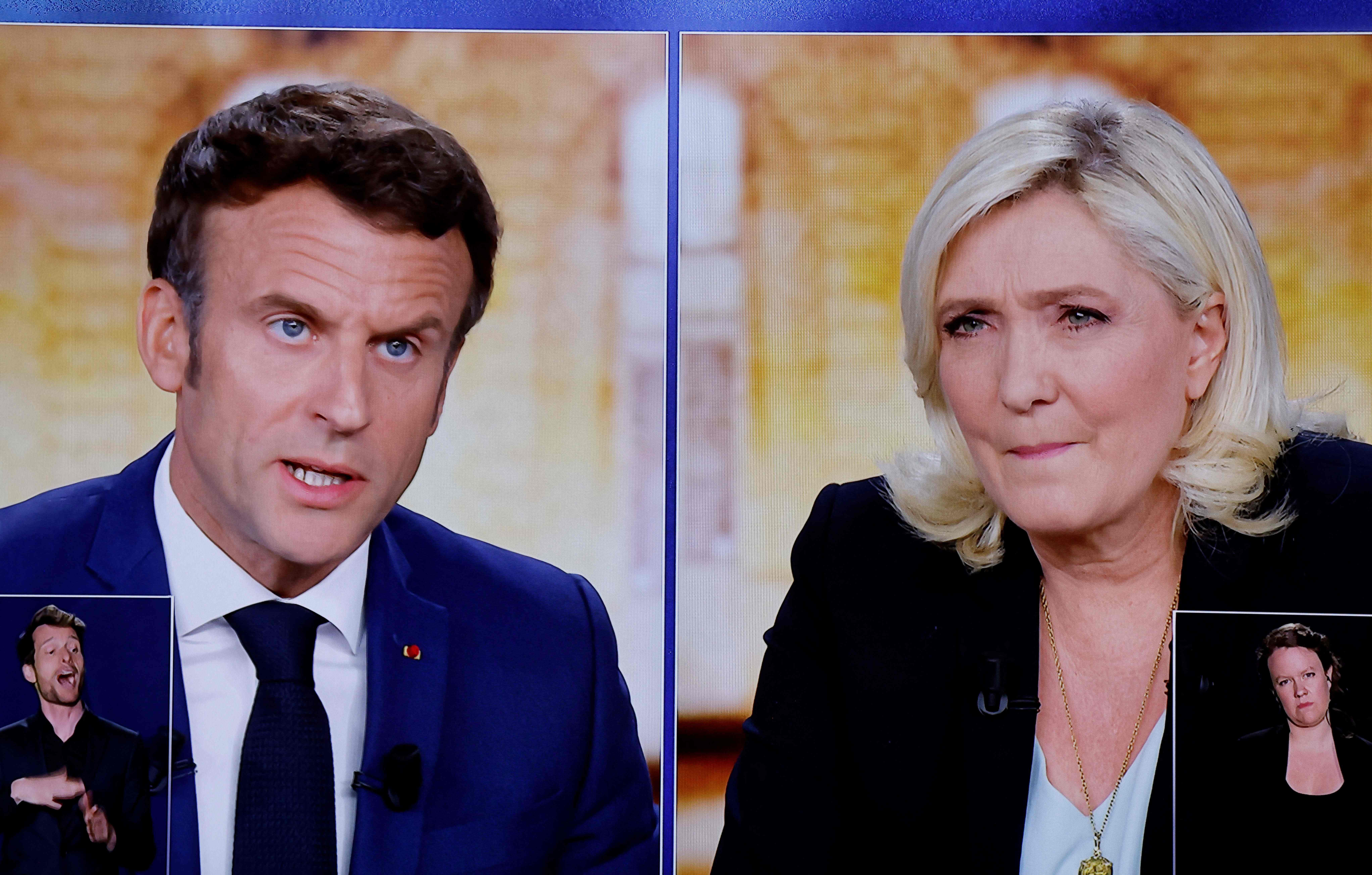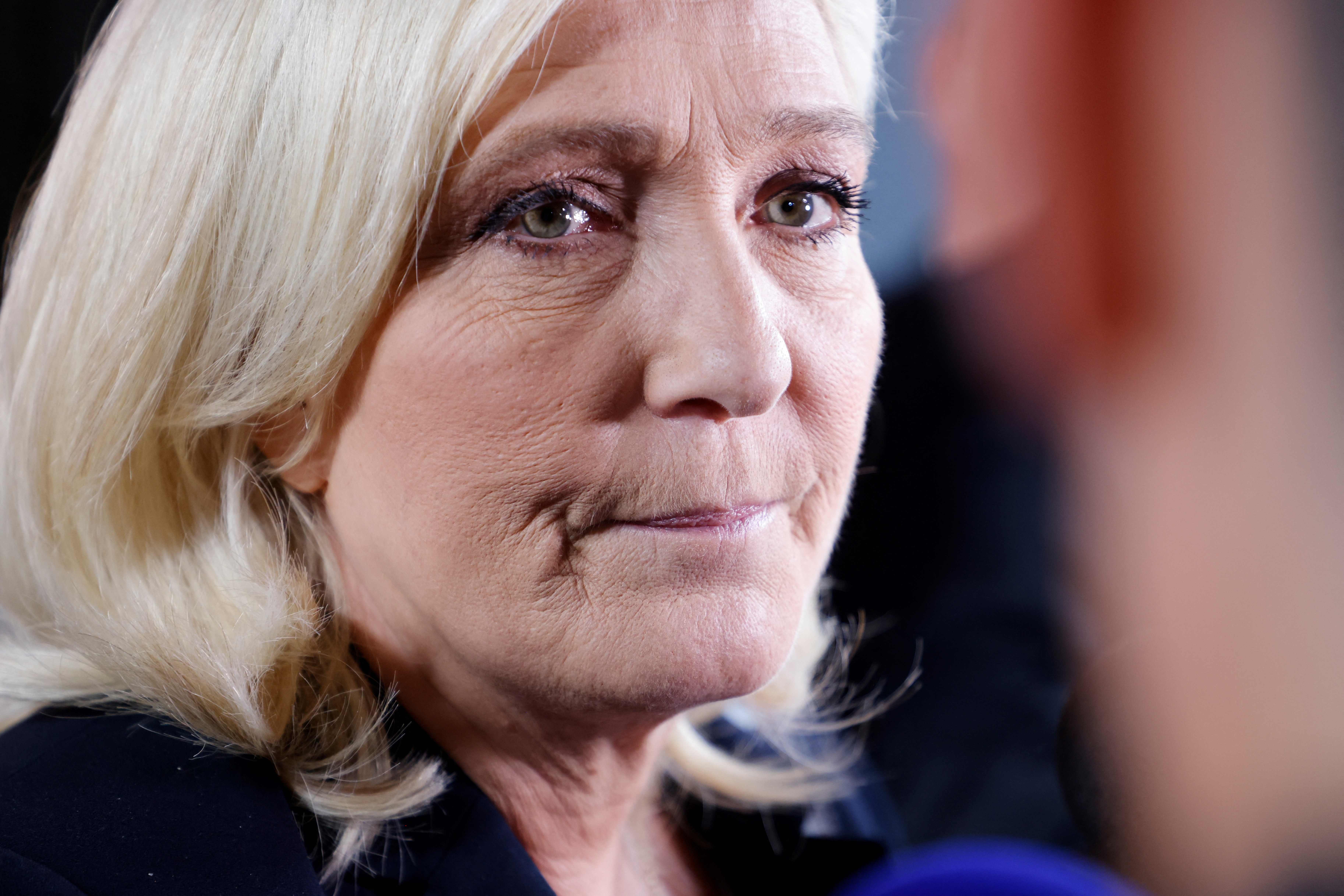Macron and Le Pen appeal to their base in a divided France during gruelling TV debate
Borzou Daragahi saw Le Pen perform better than in 2017 but Macron landed blows over her ties to Putin


Emmanuel Macron accused his challenger Marine Le Pen of being beholden to Russia in a fierce and dramatic televised debate over foreign and domestic policy late on Wednesday, just days before 24 April elections.
“You are, in fact, in Russia’s grip,” the French president told Ms Le Pen, raising the issue of loans worth millions of euros from Kremlin-linked banks his challenger did not deny. “You’re not talking about other leaders but your banker, when you mention Russia.”
But during a gruelling duel that stretched nearly three hours, Ms Le Pen held her own in the sometimes explosive discussions, lightly moderated by two journalists.
She insisted on her political independence and her French patriotism while calling for tough policing measures and showing a far better command of economic and policy issues than in a debate with Mr Macron five years ago.
“Our country is in dire straits,” she said. “Things are getting wilder and wilder. Insecurity is everywhere and insecurity requires a firm response. People are afraid, afraid to be robbed, afraid to be assaulted physically.”
The highly-anticipated debate, the first and only direct encounter between the candidates before the vote on Sunday, drew large numbers of viewers, who gathered before televisions at homes and cafes. The discussions generated plenty of sparks as the two spoke to each other, raised their voices and sparred over the role of Islam in French society, immigration policy, as well as the economy, the retirement age, climate change, technological innovation and education.
But neither candidate scored a knockout blow against the other. And the lengthy confrontation will probably fail to sway voters in significant numbers, with two candidates appealing to two starkly different constituencies. Ms Le Pen’s supporters are overwhelmingly rural, poorer and uneducated while Mr Macron’s are cosmopolitan, wealthier and urban.
Among her supporters, Ms Le Pen’s performance probably solidified her support; she performed much better and more smoothly than the 2017 debate, where she frequently lost her cool and displayed a poor command of subject matter. She is polling below Mr Macron at between 44 per cent and 48 per cent of voters but far better than the third of votes she drew in the 2017 elections.
Mr Macron’s sharp jabs over her ties to Vladimir Putin and her agenda of undermining European Union norms may spur those apathetic about the election – about a quarter of the French electorate – to the polls.

“Mr Macron didn’t need a big win because he’s already winning,” said Alain Lefebvre, a former French diplomat and author of Macron Unveiled, a recent book. “Ms Le Pen needed to dispel the effects of her 2017 performance, which she did.”
Nabil Ait Akkache, an adviser to the parliamentary bloc of Mr Macron’s En Marche political party, said the debate showed Ms Le Pen clearly still lacked mastery over complex issues of state, that her train of thought was off and that her ideas remained incoherent.
“She confuses everything and that worries me,” he said in an interview. “For someone who would like to be president, she’s clearly not qualified.”
The election on Sunday in France, a member of the United Nations Security Council, comes at an important juncture in European history with Russia attacking Ukraine. France has been among the most important pillars of the effort to help Ukraine, providing weapons and air and ground support for eastern European Nato members.
Ms Le Pen said she supported providing Ukraine humanitarian and financial aid but opposed delivering offensive weapons and opposed sanctions on Russian oil and gas, and was concerned that punishing Moscow too harshly could push it into the arms of China.
“We need to be careful,” she said. “Delivering weapons to Ukraine could turn France into a co-belligerent.”
Mr Ait Akkache suggested voters would be sensitive at this moment over any hint of Russian ties to a candidate, and Ms Le Pen failed to explain away her Kremlin links. “When you are president of France or any country of the world you need to be independent,” he said. “She’s not independent and that’s what she showed tonight.”
The two candidates outlined starkly different visions for France’s role in the world. Mr Macron spoke repeatedly about France’s partnership with Germany, and about the importance of the EU, noting that it was the body that led to the creation and mass production of the mRNA Covid vaccine that reduced the impact of the Covid-19 pandemic.
Though she has abandoned her previous advocacy of a Frexit, Ms Le Pen has argued for a “Europe of nations” that would replace the EU. “There is no European sovereignty because there is no such thing as European people,” she said, blasting Mr Macron for placing the EU flag at the Arc de Triomphe.
Both clashed over energy policy, attempting to outdo each other in advocating for France’s vast nuclear power industry. Mr Macron accused Ms Le Pen of being a climate change sceptic. She acknowledged that she believed that France needed to slow any ecological transition to protect French workers.
Mr Lefebvre speculated that Mr Macron’s emphasis on ecological and environmental issues and Ms Le Pen’s seeming hostility to solar and wind energy could help the incumbent with young leftwing voters who supported other candidates during the 10 April first round of the elections.

“Macron clearly showed Marine Le Pen has no programme in this domain,” he said. “Marine Le Pen showed no interest in renewable energies but she wants to insist on nuclear energy.”
The sharpest clash of the night came over Ms Le Pen’s controversial proposal to ban the Islamic headscarf in French public spaces.
“I am not fighting Islam,” she said. “What I fight is Islamist ideology, which attacks the very foundation of our republic.”
Mr Macron accused Ms Le Pen of violating French republican principles and trying to incite a civil war by dispatching police to hunt down women wearing headscarves or any other religious symbols.
“In your France you would have police running down the streets and arresting people wearing hijabs or the kippah,” he said. “There are many French citizens who are Muslims. We have Muslims who died in terrorist attacks and you want to take her headscarf off.”
Ms Le Pen, reflecting doubts about Mr Macron among even his own supporters, accused him of being an elitist for resisting calls to hold national referendums on major issues. Mr Lefebvre noted that Mr Macron’s sarcastic jibes during the debate could turn off some voters. Still the president thanked Ms Le Pen effusively at the end of the debate and complimented her demeanour, a gesture she did not reciprocate.
“You have divided the country,” she said. “People feel your contempt.”






Join our commenting forum
Join thought-provoking conversations, follow other Independent readers and see their replies
Comments